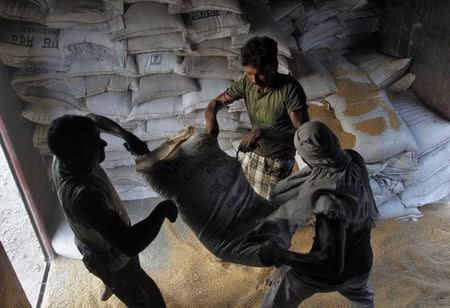Ram Vilas Paswan says no plans to raise food handouts
NEW DELHI (Reuters) - India does not plan to raise grain allocations under its food welfare programme, Food Minister Ram Vilas Paswan told Reuters on Tuesday, after a newspaper report quoted him backing an increase in such subsidised handouts that would have stretched state finances. Increasing the distribution of cheap food to the bulk of India's population would have pushed up the $19 billion food subsidy bill for the fiscal year through March 2015, at a time when government finances are already under pressure. "It is true that we have large stocks of rice and wheat but there is no proposal, no suggestion, to give 7 kg instead of 5," Paswan said in an interview. "There is no such plan." Tuesday's edition of the Economic Times had quoted Paswan as saying that with "huge stocks of grain in the country we want to increase (the) monthly entitlement to 7 kg". A finance ministry official said the fiscal deficit target of 4.1 percent of gross domestic product for the current year left no possibility to raise food subsidies. India is already at loggerheads with the World Trade Organization over its decision to veto a landmark global accord because it wanted more attention paid to its demand to be able to stockpile subsidised crops to ensure security of supplies. In a filing earlier this month, India disclosed that it spent $56 billion on farm support and food stockpiling in 2010-11, arguing that it was conforming to agreed limits on agricultural subsidies. India's veto has derailed implementation of the WTO trade facilitation agreement struck last year in Bali that would have simplified and standardised procedures for moving goods across borders. The deal was the most significant achievement in the WTO's 19-year history and, according to some estimates, would have added $1 trillion and 21 million jobs to the world economy. (Reporting by Mayank Bhardwaj and Manoj Kumar; Writing by Krishna N Das and Douglas Busvine; Editing by Alan Raybould)

 Yahoo Finance
Yahoo Finance 

